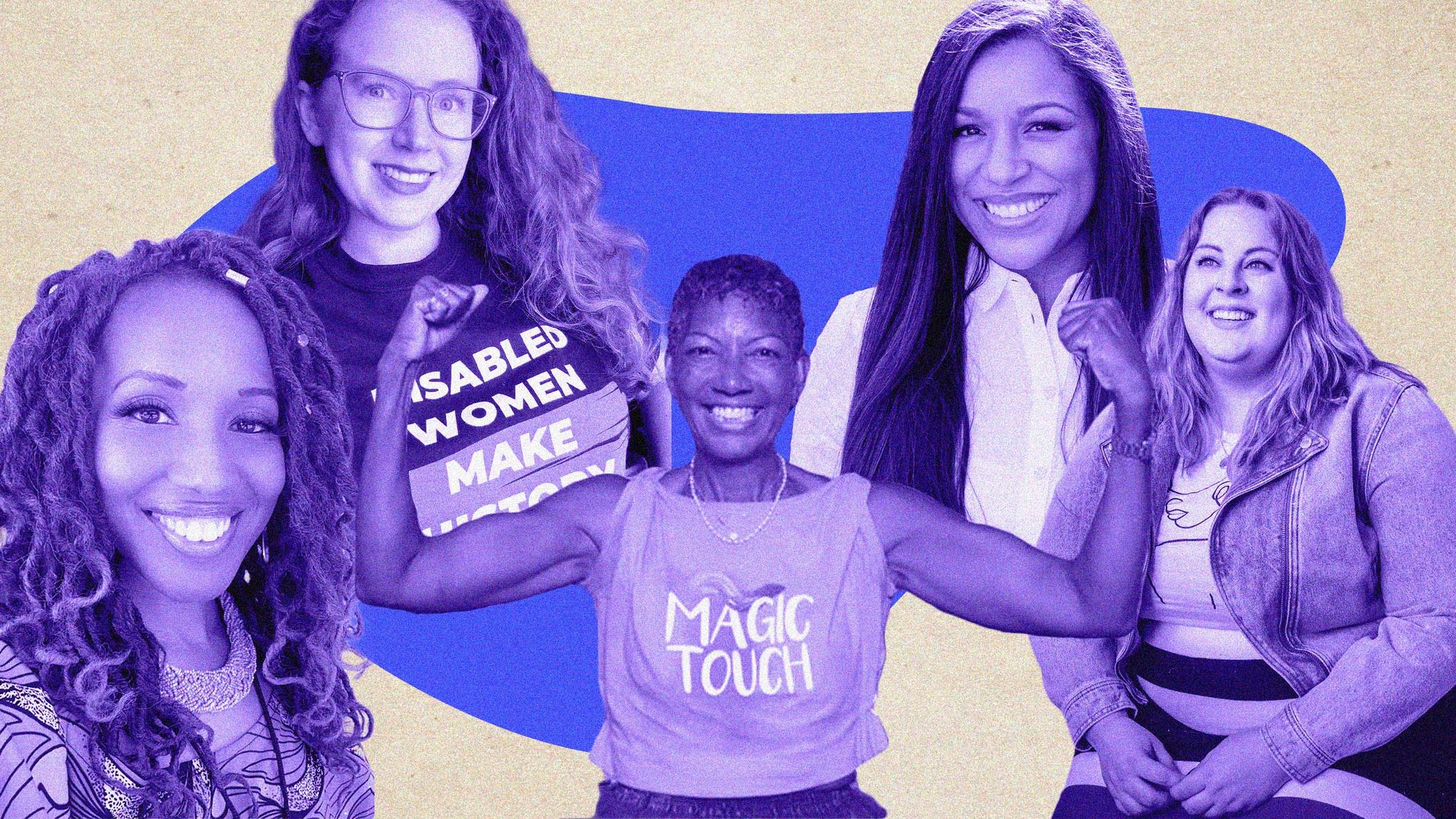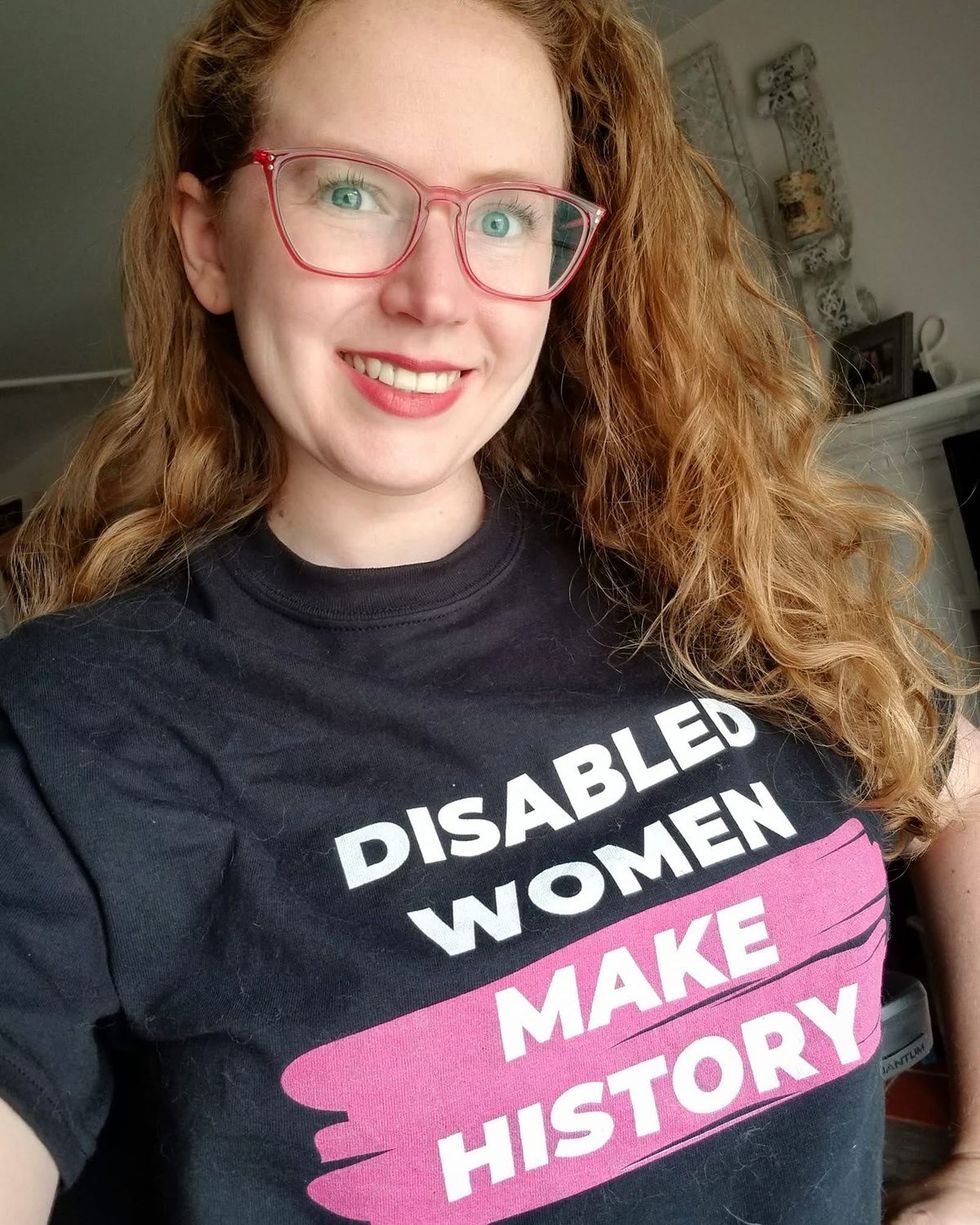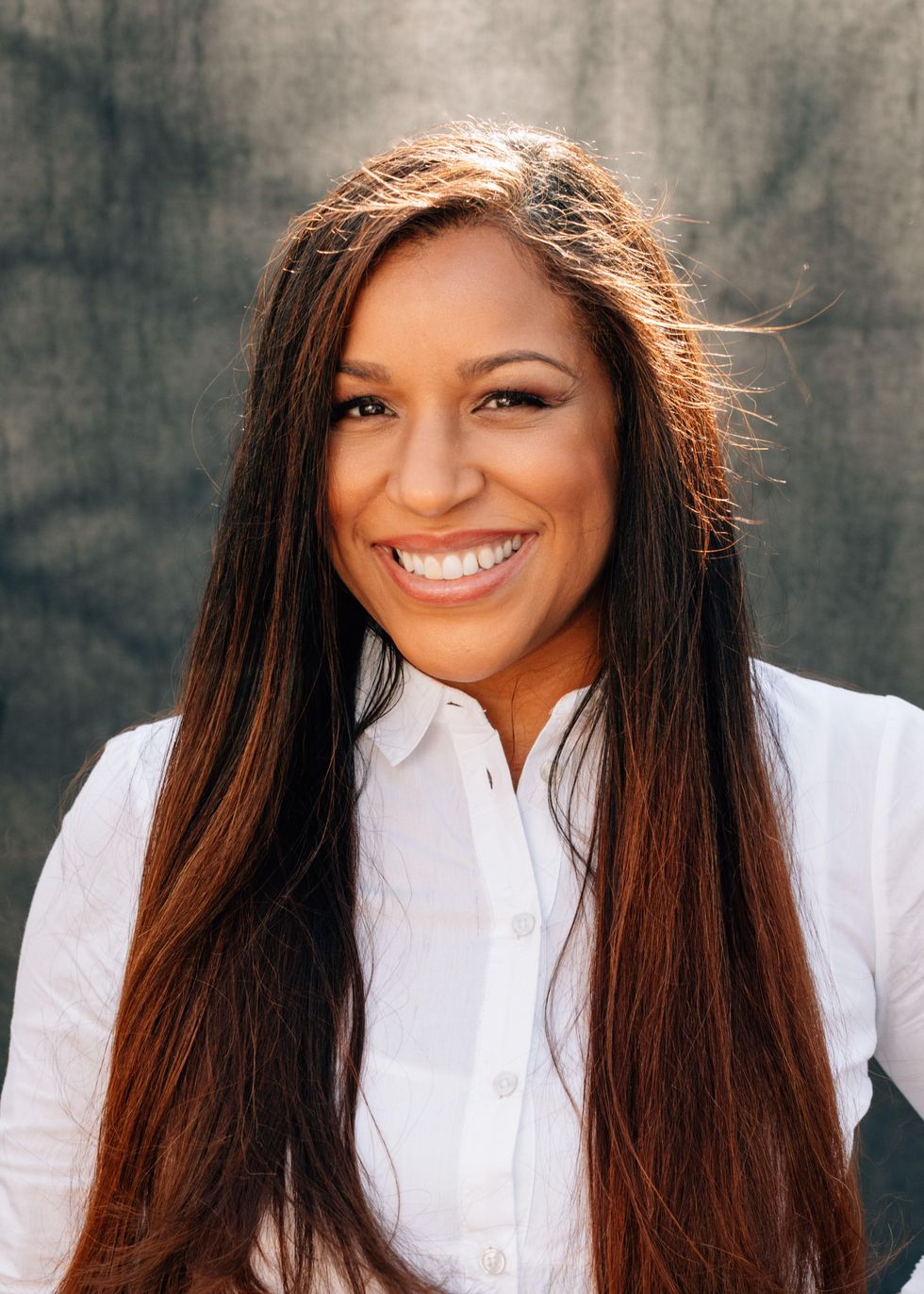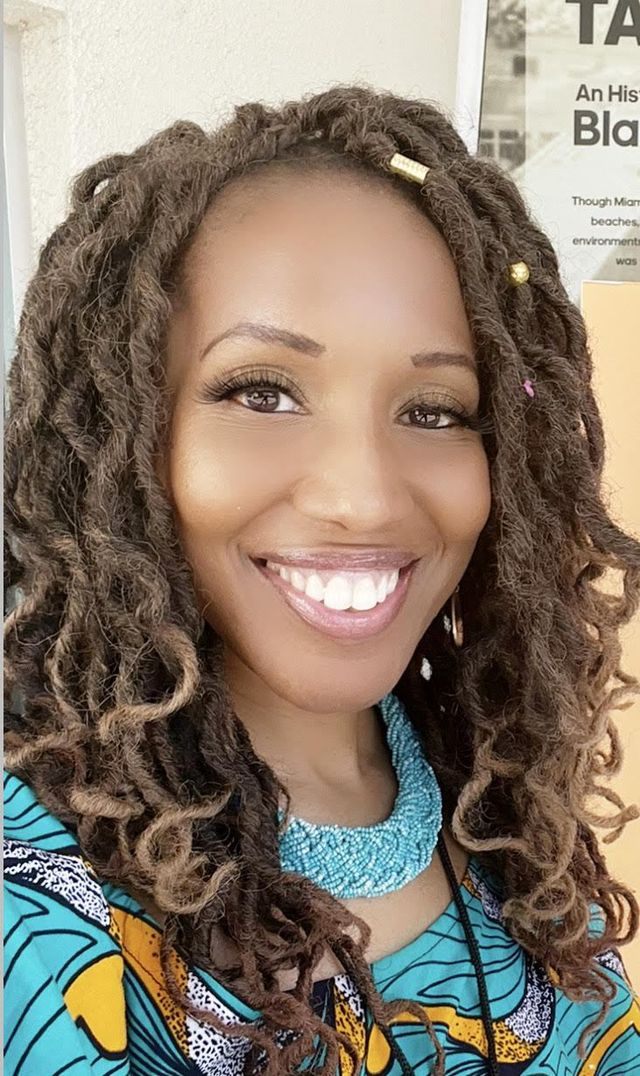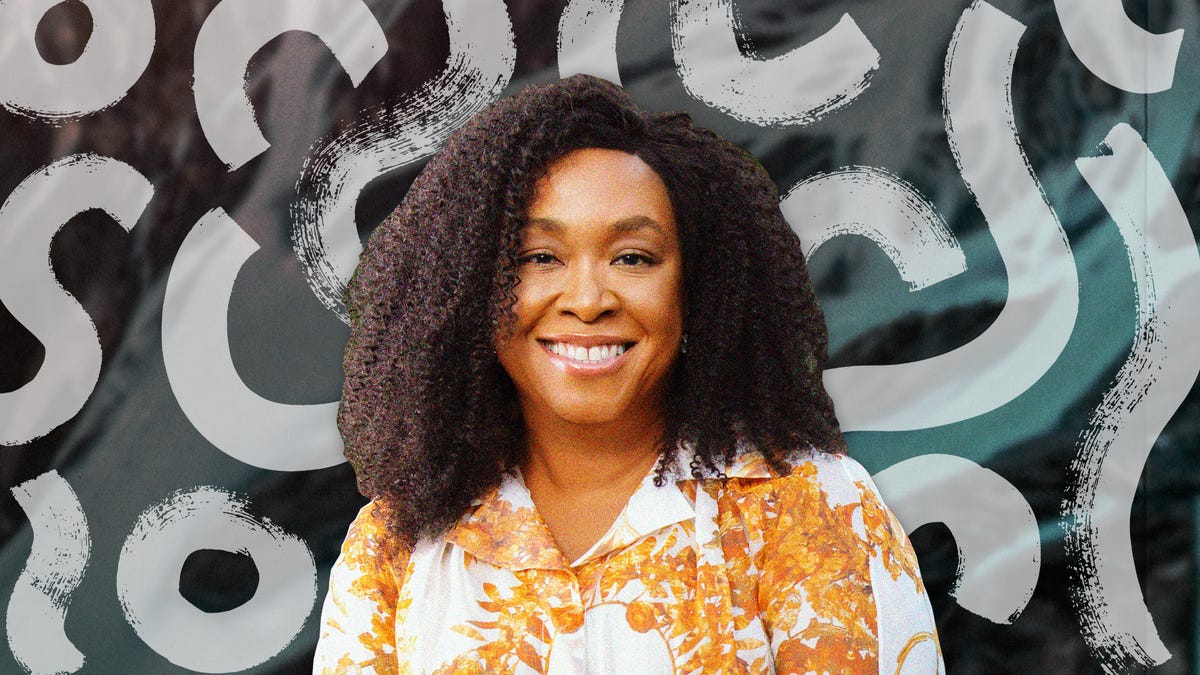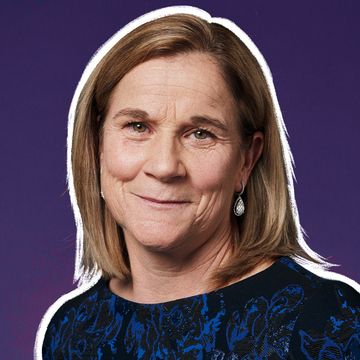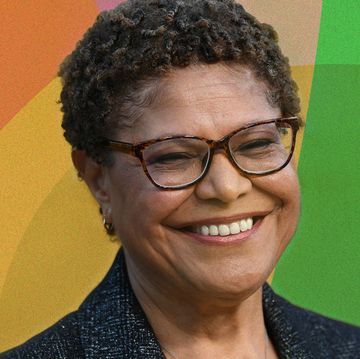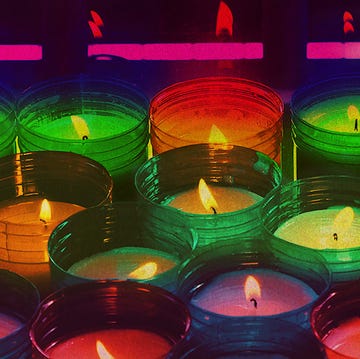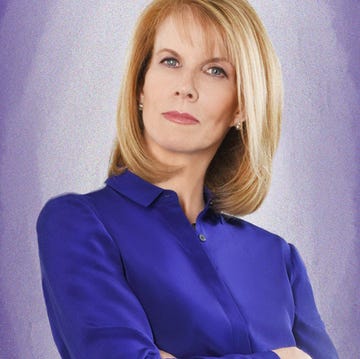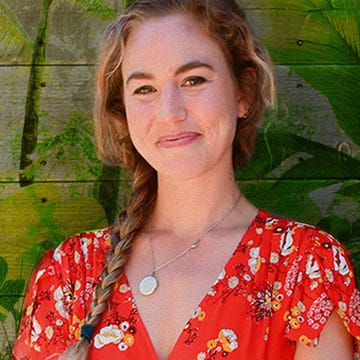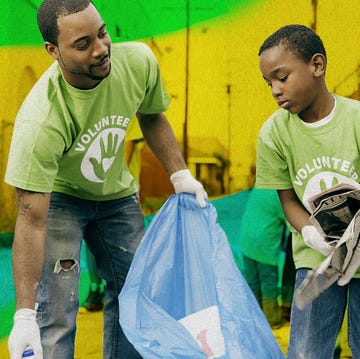As demonstrated by our increasingly stratified society, changing someone’s mind can be difficult. Literally, pick a topic — whether it’s politics, our own health, or what we think about anything happening in culture, our views and opinions about the world around us are built over time, hard-baked by personal experiences and enforced by societal norms. Unraveling that complicated web of influences takes time, patience, and plenty of compassion.
But as set in our ways as we can be, we could all benefit from recalibrating our various thought processes. The world is always changing, so why shouldn’t we? Which is why this month, we gathered five women dedicated to changing the way we think about pressing issues. Their focuses are all different — from disability advocacy to teen pregnancy, to investing, to fat liberation, and eliminating Black breast cancer mortality — but their goals are all the same: creating a more equitable world by challenging our perceptions of what’s possible.
Stephanie Woodward, co-founder of Disability EmpowHer Network
As an attorney, organizer, and activist, Stephanie Woodward can do anything — including leading a disaster-response ground team in Puerto Rico and protesting on Capitol Hill for disabled health care. However, as she recalls, it wasn’t until she was an adult when she truly saw other wheelchair users like herself in positions of power. That’s something she’d like to change for other young disabled women.
“Girls in general need to have strong, successful role models,” she says. “Studies show that girls with disabilities have a greater need for successful disabled women role models because we don’t see that in society. If you don’t see it, then it’s really hard to believe that you can be it, and disabled girls are growing up in a really unique situation in the worst part of a marginalized community.”
Disability EmpowHer Network is looking to change that by creating those communities early and challenging what it means to be disabled through multiple programs. There’s the Letter From a Role Model pen-pal program, where women and girls are matched and glitter pens and stationery are put to good use. And the EmpowHer Camp, which brings mentors and girls together for a week of learning that transitions into a year-long partnership. And as Woodward notes, the program may be aimed at teenagers, but it’s been a special experience for everyone.
“It’s really a part of so many disabled women’s stories, and that’s why so many disabled women have come to us and said, ‘I want to volunteer. I want to offer my support because I didn’t have this growing up.’ So, we in our first year had over 250 women reaching out, saying, ‘How can I help?’ So many more women had reached out offering to support than we had girls reaching out to receive support, which was amazing.”
The overwhelming response for volunteers
“In our first year, we had over 250 women reaching out, asking how they could help. No girls had to wait to be matched with a pen pal — the longest waiting process was us just trying to sift through who was the right match, rather than having to search. It was the best problem in the world to have. I didn’t have disabled women role models growing up. I felt very alone. And it’s really isolating. You just kind of feel like you have to overcome and be more and improve yourself — and you shouldn’t have to feel that way! You should feel that you are whole and essential just the way you are. But you don’t feel that way if you don’t have someone showing you that it is perfectly fine to be a person with a disability. There’s nothing wrong with you. In fact, you can celebrate who you are, and there’s strength in that. But that’s not the message that we get every day, and it’s really hard to be able to get that message from someone who understands and has done it.”
Helping everyone rethink what’s possible
“It’s really mind-boggling. Especially for families who have only seen their daughter depend on them. It was a shock for me when parents would drop off their daughters and were told they weren’t allowed to help here. That’s the rule: You drop her off, and she’s now the sheriff. There’s nothing that a woman with a disability can’t do. We need a fire started. Guess what? We’re gonna do this together. She needs help transferring to a toilet? We were all young girls with disabilities who need that help — who better to do that than someone who has gone through it? So, it really takes this idea that we need non-disabled people to care for us and throws that out the door and shows girls with disabilities that interdependence is a beautiful thing. And it takes disability hierarchy and breaks it down because we have girls who are autistic helping girls in wheelchairs with physical tasks, and girls who are using wheelchairs helping girls with Down syndrome understand the instructions of how to build a shower chair. So, the girl with Down syndrome is doing the physical task, while the girl in the wheelchair is explaining how to do the physical task. They’re learning how to accommodate each other and building a much stronger disability community for the future.”
On empowering young girls to create long-term change
“Every girl is paired with a mentor at camp. She gets to choose her own mentor, and we really think that that’s important. We would say that a successful mentoring relationship allows the young woman to have a say in who is going to mentor her for a year. Who am I to predetermine who should be helping you for the next year of your life? Once the girls are matched with their mentors, the girls are required to work on a community-based project for a year. The only requirements are that it has to be related to a disability theme in some way, and it has to help their community. They have to complete it because in July, they come back together on a reunion trip in Washington, D.C., and then they get to present it in Washington, D.C., to leaders within the disability community. They get to meet with Congress to talk about why disabled girls should be involved in decisions that impact their lives. The projects have ranged from things, like one of our girls is evaluating local domestic violence shelters to give them feedback on how to be more accessible and disability friendly, which is really important because women with disabilities are two to four times more likely to be victims of domestic violence and sexual assault. Another girl is collecting data from across the United States and writing a white paper on how ill-prepared school districts are for helping students with disabilities during school shootings. So, the outcomes are just absolutely incredible. And they’re each just absolutely killing it in their own way. And we’re just so impressed with the amazing things that each of these girls are doing.”
Nicole Lynn Lewis, founder and chief executive officer of Generation Hope
Nicole Lynn Lewis was a promising student and about to leave for college when she found out she was pregnant. Suddenly, her carefully laid plans were in danger of being derailed — and there weren’t any teen moms in the community she could look to for guidance.
“If you did see them after they had their baby, they were working in retail or food-service jobs; they weren’t going off to college,” she recalls. “So, it was really hard for me as a student to now be faced with the fact that I was going to be a young mom, and there wasn’t a clear path toward getting that degree. And at the same time, I really knew that college was probably the best way for me to provide for this little life that was growing inside of me.”
Without systems in place to counter economic uncertainty, sleepless nights, and an educational culture that favors the child-free, it would have been easy for Lewis to slip through the cracks. However, in 2003 she became one of the 2 percent of teen parents to get a college degree, when she graduated from William & Mary with a bachelor’s degree in English. It’s experience that’s allowed her to tell her own story, both in her 2021 memoir, Pregnant Girl, and also in founding Generation Hope, a nonprofit aimed at providing teen moms seeking higher education the emotional and financial support they need in order to succeed.
On breaking down the stigma
“There’s this notion that if you’re a teen mother, you don’t deserve to go to college. We have to really name that stigma and stop the shame that was imposed on young mothers, because what we really are telling them is that they’re not deserving of resources and support. They’re not deserving of continuing their education. And then I think even more broadly, as we look at mothers of any age, and parents of any age, the student-parent population in college is actually a significant population that includes almost half of all Black female undergraduate students across the country. The notion that if you’re coming into higher ed and you have a child, you’re not deserving of resources and support — that’s what really prevents us from talking about the importance of supporting student parents but also wrapping them with the resources and the support that they need to graduate so we can really change those statistics.”
On finding her purpose
“I never envisioned myself as a CEO or as someone who was on the front lines really creating that kind of change. It really took me a little while to embrace the idea that, yes, it is me. I had this lived experience, I had this vision for what I felt needed to exist in the world, and I also had shifted from the private sector into the nonprofit sector and had fallen in love with social change, and social justice organizations, and youth organizations. So, I really recognized that I was the right person to do this. And I think that is also kind of what so many women are often thinking, that that’s reserved for other people who have resources or who check all of these boxes, when in fact, we’re the person who is best suited to do this. And so, once I came to that place and really started to embrace being the leader of this organization, I started just moving really quickly. It felt almost like a call on my heart to do the work, and I started very much from the ground up building the organization from my husband’s man cave. We didn’t have an office; he didn’t have any employees. I had to tap my networks, and I had to pound the pavement and start telling people what my vision was for the organization. And honestly, there were some people who were really against me starting this organization because of that shame and stigma that’s associated with it.”
On empowering young parents to help one another
“One of our core beliefs at Generation Hope is that the students that we serve are really the experts in this work. And we live that out, and a lot of our programming is molded and shaped by feedback and insights from our students. So even in the technical assistance work that we do with colleges and universities, each of the institutions that we work with in our family cohort, they have a student-parent who works in a compensated position. We want them to be valued around the table as experts in that work. Our students can help us define what our priorities should be for our policy and advocacy agenda. So, we listen to them and really try to identify the common themes that they elevate for us. But also, they’re going to be front and center in helping to tell their stories, helping to get policymakers and researchers to understand why a lot of these policy priorities are important, and how these policies impact them in their everyday lives.”
Charlene Fadirepo, founder and CEO of Guidefi
There’s a cliché when it comes to crypto currency: namely, the white, affluent “Bitcoin bro.” That’s where Charlene Fadirepo, founder and CEO of Guidefi, comes in. It’s her mission to make it easier for professional Black women to find their ideal financial advisers. And yes, that includes introducing them to the crypto world and creating nonjudgmental spaces where they can learn about potential future gain — something that should be open to everyone.
“There’s so much groundwork to be done,” she says. “We’re focusing on education, we’re focusing on policy, we’re creating spaces that are more inclusive, because there’s so many gaps, it’s crazy. But it’s wonderful because you just don’t get a chance to build the next generation and the financial ecosystem every day.”
How to change the environment of crypto spaces
“There are actually large numbers of people of color investing in the space. There’s data to show that Black and Latino investors are investing in cryptocurrency at higher rates than other investments. But I want to see even more people of color investing. So, I think step one is getting more women and communities of color investing. I think step two is to get these communities working in the industry. It’s one thing to invest in crypto, but what about working for a Bitcoin mining company? I’d like to see more women and people of color actually working directly in the industry and driving change. And then, the last piece, and this is where I’m spending some of my time now, is the policy part. We need to make sure that communities of color are not left out of consumer protection. We have to make sure that the policy that we promote spurs innovation. So, I’ve been spending a lot of time making sure that the policy argument is fair and inclusive.”
On communicating her vision to others
“One of the books that I’ve written is called Bitcoin and the American Dream. We were Republicans, Democrats, Libertarians, Black, white, Asian, you know, boomers, millennials, and we came together to write the book because we wanted to look at Bitcoin first as a tool to help America, and we’ve been using the book to engage senators and congressmen, because we just believe that this industry is new. So, our elected leaders need to have a grounding of good information so they can make good policy decisions. The cryptocurrency argument has been led by conservatives and led in a way that it really focuses on white men. And I think that we need a more bipartisan discussion. When it comes to crypto policy, we can talk about how it’s good for communities of color, how it’s good for women, how these groups that, in some cases, have been traditionally left out in the financial system can thrive through Bitcoin investing and through Bitcoin savings.”
How investing transforms lives
“I see just an incredible renewed excitement about investing. I see women that feel more confident in their ability to make financial decisions. I see a renewed level of financial agency. So, all of the wonderful financial behaviors that I would want to see in any investor, you begin to see when you empower a woman with this information. All of a sudden, she didn’t have to ask her husband or her boyfriend, or not feel like she knows what’s going on. And then that confidence leads to positive financial changes in other areas of their lives — finding a better way to budget because you want to free up more money to invest, a preference for thinking about the future versus the present. Because hey, maybe you don’t need those shoes. Maybe you want to free up some more cash to invest. I think it’s incredible because for some women investing is just not exciting. And it can be, and so that’s what I love. It’s the economic empowerment part of it. That really is exciting for me.”
Hannah Fuhlendorf, licensed therapist, activist, and educator
Hannah Fuhlendorf wants you to stop thinking of your body as something you have to fix. The licensed therapist, activist, and educator works with clients on the mental side of body acceptance and creating a positive relationship with food. And through TikTok, where her no-nonsense videos have gained more than 100,000 followers, she’s spreading the word on fat liberation — helping others believe in a world no longer limited by fatphobia.
“Social media has simultaneously made fat liberation more accessible to people and made community organizing easier while also frequently diluting the message of fat liberation,” she explains. “It’s a constant tug-of-war trying to genuinely change the world when businesses and individuals are trying to co-opt the movement, center themselves, and turn it into ‘body positivity.’ In spite of this, I have seen a big increase in both awareness of fat liberation and action being taken largely thanks to platforms like TikTok [that] allow creators to get information out there that might not otherwise be seen.”
On reclaiming the word “fat”
“Like many people, the word ‘fat’ has been used against me as a weapon intended to hurt and dehumanize. But the truth is that treating the word fat as an insult or a slur is what gives it so much power to hurt people. In reality, the word fat is a neutral descriptor just like tall or short. Reclaiming the word fat and using it casually and frequently as the morally neutral descriptor it is has been deeply liberating for me. The word fat no longer holds any sting or shame for me. I am fat. It’s a fact. And it’s a fact that does not make me less deserving of respect, recognition, or access to the rights and resources thin people get without question. The only time I don’t use the word fat is when I’m talking to an individual about their body and they’re not comfortable using the word fat, in which case, I’ll use whatever words they use to talk about their body.”
What people get wrong about the fat acceptance movement
“For one, while there is an internal component, fat acceptance is first and foremost a social-justice movement. The goal is to end anti-fatness and to grant fat people access to all the same spaces, rights, and resources that thin folks get without question. The fat acceptance movement is a social-change movement that was founded in the 1960s and still exists to this day. Over the years, societally, fat liberation has been overlooked and largely replaced with the all-powerful ‘body positivity’ both for its profitability and the lack of real change it requires. This has allowed thin people to remain centered in the conversation around bodies and has placed the responsibility for change on fat people rather than our abusers. Luckily, there are still people fighting for fat rights. Organizations like ASDAH (Association for Size Diversity and Health), NAAFA (National Association to Advance Fat Acceptance), and a ton of small community organizations are doing great work to introduce anti-discrimination legislation all over the country. So far in the U.S., only two states and six municipalities have legislation explicitly outlawing discrimination based on weight. There’s a lot more to do, and fat liberation is the movement making that change happen.”
On starting your own fat acceptance journey — or just being a good ally
“I would always say start with education. Be hungry for information, and seek it out intentionally. I have a list of book recommendations on my pages, and that can be a good place to start. Next, I would encourage you to think about how you can work to heal whatever internalized fatphobia might exist in your own life while also advocating for systemic change. Your internal and external experiences are both important and deserve attention.
Learn about fatphobia and body politics from fat people and especially from fat people with multiple marginalized identities, and do so openly and without defensiveness. And ask how you can support fat people in specific situations as they arise. Also, use your privilege! When you witness a fatphobic incident or you confront a system that discriminates against fat people, push back! Find out what the best way is to provide feedback, and then do that. Contact your legislators and ask that they make size discrimination illegal. Ask your doctor if their practice stocks equipment like gowns, blood pressure cuffs, seating, tables, imaging machines, etc. that works for people in larger bodies. Ask them if any of their services have a BMI cutoff. Ask clothing brands to expand their size ranges. Request that restaurants, airlines, theaters, salons, amusement parks, any service with a waiting room — basically any place where seating is a core part of the experience — to provide seating that works for people of all sizes. There are a lot of things you can do.”
Ricki Fairley, CEO and co-founder of Touch, the Black Breast Cancer Alliance
When Ricki Fairley received her breast cancer diagnosis, she had just started her own marketing consultancy company where she worked on projects like the Obama for America campaign, and for AARP. However, when she was given only two years to live, she knew she was far from done — and thanks to a series of experimental drugs is now in good health. In 2020, she co-founded Touch, a breast cancer advocacy organization specifically aimed at eradicating Black breast cancer. While there’s still plenty of work to be done, two years in, they’re already changing what’s possible in the fight for medical equality.
On countering the high number of Black women dying from breast cancer
“The drugs that we have as standard of care have not been tested on Black bodies. They are not working for us. The original drugs that most of us are given didn’t work for me. There is now a growing body of research that validates that Black breast cancer cells have a molecular difference from white breast cancer cells. Check out the work of Dr. Svasti Haricharan and Dr. Melissa Davis and others. And the current participation of Black women in clinical-trial research is 3 percent. Until we advance the science and get drugs that have been developed for Black breast cancer, we will continue to have these horrific statistics. It needs to be mandated that research participation be commensurate with the burden of disease. My goal is to have the drug where the label specifically says, ‘This drug is for Black breast cancer.’”
How she discusses clinical trials with Black women who might have serious doubts
“I did a major research study last year to better understand the emotional barriers to clinical trial participation by Black women, and to unpack that fear. I was blessed to receive the Genentech Health Equity & Diversity in STEM Innovation Fund that enabled me to garner a team to validate what we know about the earned medical mistrust and what the industry uses for blame in the social determinants of health. In addition to that validation, we took a hard look at and tested concepts for how we could develop better communication tools to change the game on how Black women think about clinical research. We interviewed 48 Black Breasties — our term of endearment for anyone who has or is experiencing breast cancer — and some family members qualitatively and then did a quantitative study of 260 to magnify the data.
What have found to work, what I, a Black Breastie, a voice of trust, can use to convince a Breastie to change her mind is these nuggets: by erasing the fear with a clear and elementary understanding what standard of care is, how the science actually works, and how you get a higher quality of care in a trial because you have more supervision and more support. Explaining that the Advil you took for a headache, or the Tylenol you gave your baby, or that antibiotic you gave to your dog were all in clinical trials. Explaining that because none of the standard of care drugs we take have been tested on Black bodies, so whatever chemo you are taking is really a clinical trial in your own body. You hope and pray that it will work, but there is no real data about how it works for Black breast cancer to guarantee a favorable outcome. And most importantly, I pull on the heartstrings of us purple cape and gold crown-wearing, powerhouse, Harriet Tubman want-to-be, take-care-of-everyone-at-the-expense-of-ourselves, badass women that we are and say, ‘Do it for your daughter. Do it for your son. Do it for your sister.’ And that works!”
What women are surprised to learn
“When approached the right way, with love and information, they hear it, they get it, and they embrace it. We are two months into our movement, 400 Black women have joined our movement, and 300 Black women have searched for clinical trials through our site. The trend is on the upward trajectory. They are clearly surprised to learn that there is no sugar pill in cancer research, that every medication we take has been in a clinical trial, that you do get better care, and you can help the people you love. All of the real facts about research are surprisingly a surprise. Their fear is based on lack of knowledge. If you read anything else on Dr. Google about clinical trials, it will scare you to death. It does scare them to death. Giving them the information with cultural humility and from a trusted voice makes a world of difference. We want Black women to see themselves and hear from women who look like them.”
Laura Studarus is a Los Angeles-based travel writer who has contributed to Fast Company, BBC Travel, and Thrillist. Follow her on Twitter at @Laura_Studarus.
Get Shondaland directly in your inbox: SUBSCRIBE TODAY
